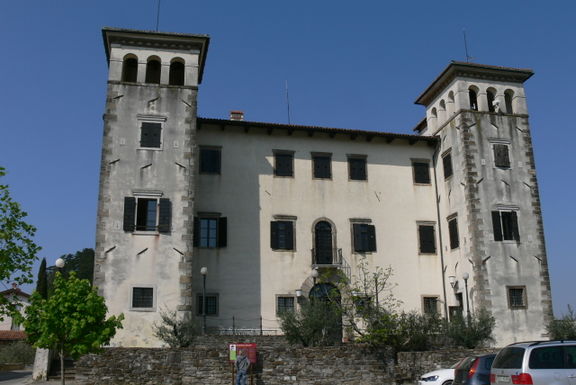Difference between revisions of "Dobrovo Castle"
| Line 58: | Line 58: | ||
[[Category:Museums]] | [[Category:Museums]] | ||
[[Category:Visual arts museums]] | [[Category:Visual arts museums]] | ||
| + | [[Category:Castles]] | ||
Revision as of 19:21, 27 April 2010
History
The Colloredo Counts were the first owners, followed at the end of the 18th century by the de Catterini-Erzberg family from Gorica, later of the marquises of the Montecuccoli family, and in 1872 the Baguer family inherited the property.
The castle walls are believed to be built during the Second Venetian War (1615–1617) and after the war the walls were rearranged into the corridor with the arcades. One tower was changed into the chapel dedicated to Saint Anthony from Padua.
Premises
This square-shaped three-storey castle with symmetrically set four towers is built in a type of Venetian villa of the 17th century. It is surrounded by walls with two cylindrical towers.
On the ground floor there is a central entrance hall, while the first floor houses the Knights Hall, where different musical and other events are held. Some parts of frescos in Hunters’ room and along the staircase, painted by the artist Clement Del Neri in 1894, which depict the properties of the count, as well as some original items of furnishing, are preserved. In front of the castle there are remnants of former historical park.
The castle houses beside the Goriška Museum branch also the restaurant on the ground floor and the wine cellar with marvellous wines from Goriška Brda. The castle is also used for temporary exhibitions, which happen in the Gallery, as well as other cultural events that are held in the magnificent castle yard.
Exhibitions
The exhibition Castle Collection in Dobrovo – Attempt of Reconstruction, and the exhibition Trade in Wine and Borders - History of Abuja Brothers Company in Gorica 1899–2009 are on the permanent display. The chapel houses a permanent exhibition of gothic frescoes – originals and copies taken from other churches of the North Primorska region.
On the first floor, next to the Knights Hall, a 19th-century cultural history collection is displayed with photographs, original objects and works of art. Also displayed there is a 17th-century fresco depicting the scene of the naval attack of the city and the coats-of-arms of former owners. Morever, a part of the collection of paintings of the last owner, count Bagueri, is also on display in the castle.
The second floor exhibits a collection of 134 prints by world-famous artist Zoran Mušič (1909–2005), dating from 1949 onwards. The art works are emotionally related to Dalmatia, Istria, Karst, Umbria and Venetian lagoon. The cycle We Are Not the Last [Nismo poslednji] is marked with the artist's experience in Nazi camps.



